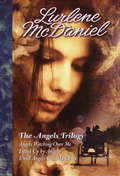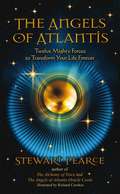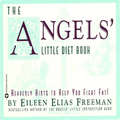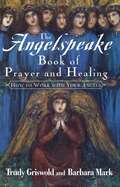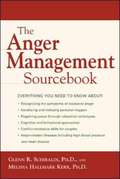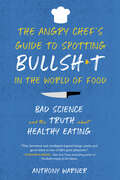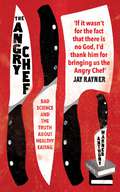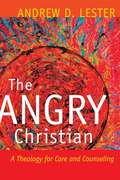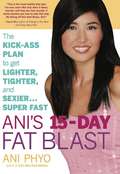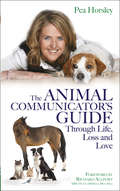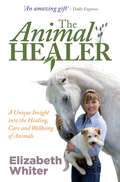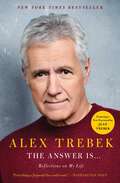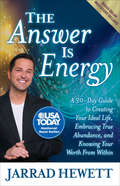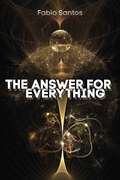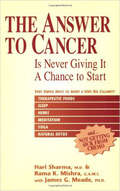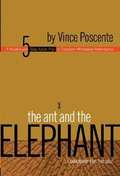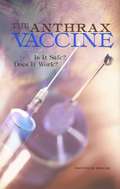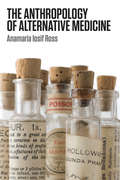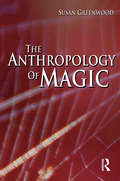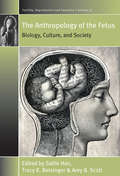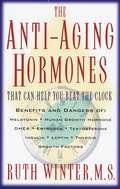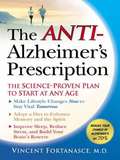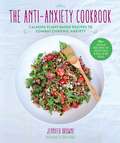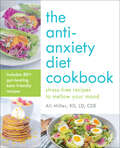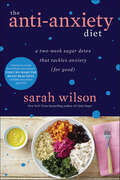- Table View
- List View
The Angels Trilogy
by Lurlene McdanielLeah is not happy about being stuck in the hospital for the holidays while her mother is thousands of miles away on a honeymoon with husband number five. Until she meets her hospital roommate, Rebekah, and her big family. Cynical 16-year-old Leah has never known people like this before. From Rebekah's handsome brother, Ethan, who can barely look Leah in the eye, to her kind older sister, Charity, the Amish family captivates Leah with its simple, loving ways. When Leah receives frightening information about her condition, her new friends show her that miracles can happen. And that sometimes angels appear in the most unexpected places.From the Paperback edition.
The Angels of Atlantis
by Stewart Pearce Richard CrookesBased on the teachings of the 12 archangels of Atlantis, this spiritual resource reveals how to become aligned with their power and wisdom. The 12 angels are depicted through extraordinary illustrations that accompany their written message, and each angel is mirrored by a priest-scientist that contributes to its divine energy. A series of exercises awakens the archetypal guidance of each incredible force, creating a spiritual environment in which joy and well-being are sustainable. Providing faith seekers with a deep connection to the ancient realm of Atlantis, these inspirations offer powerful counsel and healing.
The Angels' Little Diet Book: Heavenly Hints to Help You Fight Fat
by Eileen Elias FreemanAuthor shares the prayers, affirmations, advice, and biblical quotes that helped her lose over 120lbs.
The Angelspeake Book Of Prayer And Healing
by Trudy Griswold Barbara MarkTwo years ago, Barbara Mark and Trudy Griswold published a remarkable book that showed us how we could reach out to our angels for guidance, comfort, and love. Drawing on the unique angel communication techniques that these two sisters have been teaching in workshops across the nation, Angelspeak has sold more than 45,000 copies to date, and another 15,000 in its Spanish-language edition.Now the authors take us to the next step: calling upon God’s messengers for help in solving personal problems and healing. Focusing on the specific steps we can take to solicit angelic intervention in times of crisis, they offer wisdom and practical advice on such topics as getting clarity on what we want in our lives, how to be trusting no matter what happens, and the power of divine healing. Interspersed throughout are the stories of people who have used the Angelspeake process and have had their dreams fulfilled.A partnership with the divine is there for the asking—that is the uplifting message of this handsomely designed and illustrated book.
The Anger Management Sourcebook
by Glenn R. Schiraldi Melissa Hallmark KerrExcessive anger can destroy your relationships, career, and even health. Scant professional literature has been available on the topic until now. The Anger Management Sourcebook shows you how to empower yourself and redirect your anger into constructive behavior. This resource is a must-have tool for you or a loved one as well as professionals dealing with clients who suffer from excessive anger.
The Angry Chef's Guide to Spotting Bullsh*t in the World of Food: Bad Science And The Truth About Healthy Eating
by Anthony WarnerJust say no to nutri-nonsense Why is Chef Anthony Warner so angry? Two words: pseudoscience bullshit. Lies about nutrition are repeated everywhere—in newspaper headlines, on celebrity blogs, even by our well-meaning friends and family. Bad science is no reason to give up good food (we miss you, bread)! It’s high time to distinguish fact from crap. As the Angry Chef, Warner skewers common food myths that range from questionable (“coconut oil is a weight-loss miracle”) to patently dangerous (“autism is caused by toxins”). He also cuts down a host of fad diets—including the paleo diet and the infamous detox. Warner goes on to explain why we’re so easily misled: It has a lot to do with our instinctive craving for simple explanations and straightforward rules. With help from “Science Columbo,” he pares away poisonous rhetoric and serves up the delicious, nuanced truth (with a side of saucy humor). Bon appétit!
The Angry Chef: Bad Science and the Truth About Healthy Eating
by Anthony WarnerNever before have we had so much information available to us about food and health. There&’s GAPS, paleo, detox, gluten-free, alkaline, the sugar conspiracy, clean eating... Unfortunately, a lot of it is not only wrong but actually harmful. So why do so many of us believe this bad science? Assembling a crack team of psychiatrists, behavioural economists, food scientists and dietitians, the Angry Chef unravels the mystery of why sensible, intelligent people are so easily taken in by the latest food fads, making brief detours for an expletive-laden rant. At the end of it all you&’ll have the tools to spot pseudoscience for yourself and the Angry Chef will be off for a nice cup of tea – and it will have two sugars in it, thank you very much.
The Angry Christian: A Theology for Care and Counseling
by Andrew D. LesterIn this work, respected scholar Andrew Lester discusses and incorporates the newest behavioral research models, contemporary biblical and theological scholarship, constructivist philosophy, and narrative theory into a comprehensive pastoral theology of anger. In revisiting through the lens of theological anthropology the very subject that brought him to the forefront of scholarship in pastoral care, Lester presents engaging new material and innovative new methods of interventions for dealing with this often-confusing human emotion.
The Ani's 15-Day Fat Blast
by Ani PhyoLooking for that one miracle diet that will simply melt pounds away? Here it is. Premiere raw food chef Ani Phyo breaks down the myths and preconceptions of eating raw and offers a revolutionary, easy plan to help you shed up to fifteen pounds in just fifteen days simply by eating delicious raw meals. The plan is simple: eat up and speed up the fat burning and weight loss by using simple, living, and all-natural ingredients with Ani's signature recipes. Look forward to not only losing weight, but also building muscle, boosting endurance, slowing down aging, and feeling energized all day long.
The Animal Communicator's Guide Through Life, Loss and Love
by Pea Horsley'He was just a pet,' people sometimes say, and yet our animal companions are so much more to us than this, and we may feel we have nowhere to turn when faced with their loss. Millions of people have sought answers to questions like 'What happens to animals when they die?' 'What is life like for them on the other side?' and 'Will they ever come back to me?' Now, for the first time, internationally renowned animal communicator Pea Horsley shares ground-breaking true stories which reveal animals' thoughts and feelings on life, death and life after death. By hearing their views, we come to understand that animals are spiritual beings and great teachers, and that we are all connected. This collection of inspirational tales is woven together with Pea's moving story of her own dog, Morgan, and his physical struggle, his awareness of the right time to go and his insights and support from beyond the grave.
The Animal Healer: A Unique Insight Into The Healing, Care And Wellbeing Of Animals
by Elizabeth WhiterWith clear, concise and immensely practical advice on how animals communicate, behave and self-medicate, The Animal Healer is ideal for anyone who wishes to understand more about animals, healing and themselves.When her horse 'Wow' was seriously injured, Elizabeth Whiter discovered her incredible talent for hands-on healing and also observed how Wow took steps to heal himself. Now with over 1,000 animals treated, Elizabeth shares her remarkable journey, knowledge and experience. She also explains many of the theories that inform her practice, including:• how to provide hands-on healing• sensing and aligning the energies • zoopharmacognosy – an emerging science that refers to the instinctive methods animals use to self-medicate• and how to feed your animals, providing delicious recipes that are healthy for both you and your pets.The Animal Healer shows how a remarkable experience has led to wisdom that anyone who cares about animals will find invaluable.
The Answer Is . . .: Reflections on My Life
by Alex TrebekLongtime Jeopardy! host and television icon Alex Trebek reflects on his life and career.When he debuted as the host of Jeopardy! in 1984, Alex Trebek became something like a family member to millions of television viewers, bringing entertainment and education into their homes five nights a week. In 2019, he made the stunning announcement that he had been diagnosed with Stage IV pancreatic cancer. What followed was an incredible outpouring of love and kindness. Social media was flooded with messages of support, and the Jeopardy! studio received boxes of cards and letters offering guidance, encouragement, and prayers. For more than three decades, Trebek had resisted countless appeals to write a book about his life. Yet he was moved so much by all the goodwill, he felt compelled to finally share his story. &“I want people to know a little more about the person they have been cheering on for the past year,&” he writes. The book combines illuminating personal anecdotes with Trebek&’s thoughts on a range of topics, including marriage, parenthood, education, success, spirituality, and philanthropy. Trebek also addresses the questions asked most often by Jeopardy! fans, such as what prompted him to shave his signature mustache, his insights on legendary players like Ken Jennings and James Holzhauer, and his opinion of Will Ferrell&’s Saturday Night Live impersonation. The book uses a novel structure inspired by Jeopardy! and features dozens of never-before-seen photos that candidly capture Trebek over the years. This wise, charming, and inspiring book is further evidence of why Trebek has long been considered one of the most beloved and respected figures in entertainment.
The Answer Is Energy: A Thirty-Day Guide to Creating Your Ideal Life, Embracing True Abundance, and Knowing Your Worth From Within
by Jarrad HewettThis USA Today–bestselling guide is &“a powerful roadmap readers can follow to achieve true abundance, productivity, and joy&” (Seattle Post-Intelligencer). People from all walks of life are waking up to questions of &“Who am I?&” &“What is my purpose, and how can I move from places of lack, dis-harmony, dis-ease, and anger into joy, abundance, vitality, love, wholeness, and harmony—fast?&”The Answer Is Energy. In this book, multi-dimensional energy expert Jarrad Hewett shares stories that reveal how to shift energy and reframe thinking about family, money, relationships, abundance, and control to live in the moment of now. When someone&’s energy is in alignment with their true intention of being healthier, happier, and more productive, great empowerment and life changing transformation occurs. Jarrad shows readers how energy creates with thoughts, feelings, and beliefs. He also teaches how to quickly shift into a paradigm of ease, bliss, love, abundance, and tranquility.The Answer is Energy can help readers seize their best life by showing them how not to let their inner programming and the worn-out stories of their past crowd out their dreams and aspirations. People are continually looking for solutions &“out there,&” but this book shows that they have all the resources and tools inside themselves to tap into their own abundant source of energy and catapult their lives into the stratosphere. So, let&’s get started.
The Answer for everything: Spirituality concepts based on science discoveries
by Fabio SantoSIn The Answer For Everything, Fabio Santos presents the latest discoveries of traditional science by establishing relationships with the concepts of modern Spirituality in a work that can be used as a study guide, both for beginners and for those who are already familiar with the subject. Amid basic concepts of how the universe, our planet, the dimensions of reality, and how it all affects our lives today and now, complex subjects such as Quantum Mechanics and Sacred Geometry are explained in a practical and easy to understand way. It is also possible to understand the role of religions a little better in the history of mankind by raising questions about what are known as "conspiracy theories" as extraterrestrial contacts and the control that a supposed “Occult Government” exercises on Earth. In a simple and fun language like a chat with the reader, The Answer For Everything serves as a guide and encouragement to delve into the most important issues to our spiritual growth, showing some of the many paths we can follow for the so-called ascension, reaffirming that it depends only on ourselves.
The Answer to Cancer: Is Never Giving It A Chance To Start
by Hari Sharma Rama K. Mishra James G. Meade"The public hasn't had the first clue about how to prevent cancer. This book provides that clue and more. This offers effective prevention if people follow the guidelines." -Christopher S. Clark, M.D.The Raj - Maharishi Ayurveda Health Center"Charming and fun to read. It is not just a cancer book, it gives people an opportunity to learn simple, yet powerful techniques for staying fit without tough diets or impossible workout programs."-Jay Glaser, M.D. Medical Director, Lancaster Ayurveda Medical Center. Simple, natural things are the answer to cancer! Sound too easy? Here a Western research physician teams with an Eastern Ayurvedic to explain how ancient "secrets" -- that you can do from home! -- make it difficult for cancer to ever get started.
The Ant and the Elephant: Leadership for the Self
by Vince PoscenteA renowned speaker, business consultant, record-setting speed skier and Olympian, Vince Poscente believes in the enormous potential of the unconscious mind. Poscente likens the dynamic between the conscious and subconscious minds to an ant and an elephant: Our minds are separated into two distinct functions - the conscious and subconscious elements. Our ant is the intentional part of the brain, but our elephant is the instinctual, impulsive part of the brain that houses emotions and memories and even guides the body to perform vital functions. While we tend to know our conscious minds - our ants - rather well, we often overlook the power of our elephantine subconscious minds. When we do, unfortunately, we squander a wellspring of human potential.
The Anthrax Vaccine: Is It Safe? Does It Work?
by Jane S. Durch Lois M. Joellenbeck Lee L. Zwanziger Brian L. StromThe vaccine used to protect humans against the anthrax disease, called Anthrax Vaccine Adsorbed (AVA), was licensed in 1970. It was initially used to protect people who might be exposed to anthrax where they worked, such as veterinarians and textile plant workers who process animal hair. When the U. S. military began to administer the vaccine, then extended a plan for the mandatory vaccination of all U. S. service members, some raised concerns about the safety and efficacy of AVA and the manufacture of the vaccine. In response to these and other concerns, Congress directed the Department of Defense to support an independent examination of AVA.The Anthrax Vaccine: Is It Safe? Does It Work? reports the study’s conclusion that the vaccine is acceptably safe and effective in protecting humans against anthrax. The book also includes a description of advances needed in main areas: improving the way the vaccine is now used, expanding surveillance efforts to detect side effects from its use, and developing a better vaccine.
The Anthropology of Alternative Medicine
by Anamaria Iosif RossAlternative medicine is not a fashionable new trend but an established cultural strategy, as well as a dynamic feature of mainstream contemporary medicine, in which elements of folk traditions are often blended with western scientific approaches.The Anthropology of Alternative Medicine is a concise yet wide-ranging exploration of non-biomedical healing. The book addresses a broad range of practices including: substance, energy and information flows (e.g. helminthic therapy); spirit, consciousness and trance (e.g. shamanism); body, movement and the senses (e.g. reiki and aromatherapy); as well as classical medical traditions as complements or alternatives to Western biomedicine (e.g. Ayurveda). Exploring the cultural underpinnings of contemporary healing methods, while assessing current ideas, topics and resources for further study, this book will be invaluable to undergraduate and graduate students in anthropology, sociology, psychology, and health related professions such as nursing, physical and occupational therapy, and biomedicine.
The Anthropology of Magic: An Anthropology Of Consciousness
by Susan GreenwoodMagic is arguably the least understood subject in anthropology today. Exotic and fascinating, it offers us a glimpse into another world but it also threatens to undermine the foundations of anthropology due to its supposed irrational and non-scientific nature. Magic has thus often been 'explained away' by social or psychological reduction. The Anthropology of Magic redresses the balance and brings magic, as an aspect of consciousness, into focus through the use of classic texts and cutting-edge research. Suitable for student and scholar alike, The Anthropology of Magic updates a classical anthropological debate concerning the nature of human experience. A key theme is that human beings everywhere have the potential for magical consciousness. Taking a new approach to some perennial topics in anthropology - such as shamanism, mythology, witchcraft and healing - the book raises crucial theoretical and methodological issues to provide the reader with an engaging and critical understanding of the dynamics of magic.Join the live discussion on Facebook!
The Anthropology of the Fetus: Biology, Culture, and Society (Fertility, Reproduction and Sexuality: Social and Cultural Perspectives #37)
by Sallie Han Tracy K. Betsinger Amy B. ScottAs a biological, cultural, and social entity, the human fetus is a multifaceted subject which calls for equally diverse perspectives to fully understand. Anthropology of the Fetus seeks to achieve this by bringing together specialists in biological anthropology, archaeology, and cultural anthropology. Contributors draw on research in prehistoric, historic, and contemporary sites in Europe, Asia, North Africa, and North America to explore the biological and cultural phenomenon of the fetus, raising methodological and theoretical concerns with the ultimate goal of developing a holistic anthropology of the fetus.
The Anti-Aging Hormones: That Can Help You Beat the Clock
by Ruth WinterThe quest for lasting youth, vigor, and sexual potency has reached a new frontier, and this fact-filled investigation, The Anti-Aging Hormones (Crown, 1997) discusses the latest results in clinical testing of hormones. Drawing on the most current research by the National Institute of Aging, nationally known health expert Ruth Winter investigates the uses and misuses of testosterone, melatonin, estrogen, and other manufactured hormones. Her book tackles the most challenging medical questions in a field that has captured the imagination of millions of aging baby boomers.The Anti-Aging Hormones explores these questions and more:Which hormones can elevate mood and increase brain activity?Will growth hormones restore vigor and muscles in men?Is melatonin the time keeper that determines how fast we age and how long we live?How effective are thymus gland hormones in immunizing us from infections and cancer?Can estrogen prevent Alzheimer's in both men and women?
The Anti-Alzheimer's Prescription
by Vincent FortanasceIt's never too early to reduce your risk of developing Alzheimers by 70% with this science-proven and achievable plan. We've all made little jokes about incipient Alzheimer's when we do something silly or forgetful, but at heart we are terrified of ending our days in a state of mental oblivion, our personalities eradicated by this horrible disease. Advances in medical science mean that we can look forward to a long life, but what kind of life is it if the last eight years are spent joyless, helpless and blank in a nursing home? There is no cure in sight for Alzheimer's and our best hopes are captured by prevention through smart diet and lifestyle changes. These changes are the foundation of this galvanising call to action by distinguished neurologist Vincent Fortanasce. Doctors now know that the damage associated with Alzheimer's begins decades before any symptoms appear. That is why it is never too early to start applying Dr Fortanasce's straightforward and sensible lifestyle prescription. This involves first of all identifying your specific risk profile and then following his 4-step program to improve brain health. These steps are: 1. The Anti-Alzheimer's anti-inflammatory diet 2. Brain Boosters (smart exercise for brain health) 3. Brain Boosters (mental challenges to build cognitive reserves) 4. Rest and Recovery (finding your circle of quiet) There are also chapters on making a medical diagnosis and the latest medical treatments available. The Anti-Alzheimer's Prescription is medically comprehensive and fascinating to read. It is an excellent resource for anyone wishing to protect their brain to live to an active, engaged old age.
The Anti-Anxiety Cookbook: Calming Plant-Based Recipes to Combat Chronic Anxiety
by Jennifer BrowneIf you or someone you know suffers from anxiety, this book can help.What we choose to fuel our bodies with affects us wildly. In today’s world of overly processed food and artificial ingredients that almost always include empty calories and stimulants, it’s important to educate oneself on how proper nourishment positively impacts our state of mental health and wellbeing.With more than seventy-five simple recipes created to help you chill and be still, The Anti-Anxiety Cookbook will help you find the path to calm. Most of the plant-based recipes in this mindfully created cookbook contain fewer than ten ingredients, and all are tried and true. Recipes include:Anti-Inflammatory Juice Perfect Pesto Greek Six-Layer Dip Lentil Loaf Chocolate-Pumpkin Loaf And More!Kind food really is the best (and least expensive!) medicine, and in the realm of anxiousness, it’s so important to lower nutritional stress and let plant-based nutrition pave the way for decreased anxiety and more peaceful living.
The Anti-Anxiety Diet Cookbook: Stress-Free Recipes to Mellow Your Mood
by Ali MillerMake meals that soothe, nourish, and satisfy all at once!You probably already know that the foods you eat can alter your brain chemistry and, in turn, affect your moods and emotions. But how can you take control of the process instead of having it control you?The Anti-Anxiety Diet Cookbook features over 75 tasty recipes that will reduce inflammation, strengthen your gut, and nourish your body, all while helping balance your mood and emotions. Author Ali Miller, dietitian and food-as-medicine guru, serves up a wide variety of new and delicious meals that follow a ketogenic, low-carb approach to addressing anxiety. With beautiful full-color photographs and easy-to-follow step-by-step instructions, you&’ll be eating your way to calm in no time!This tasty collection of recipes ranges from savory to sweet, and includes:Citrus Pumpkin PancakesCrispy Rosemary ChickenAnti-Anxiety Diet Bone BrothKimchi Burgers, and much more!
The Anti-Anxiety Diet: A Two-Week Sugar Detox That Tackles Anxiety (For Good)
by Sarah WilsonFrom the New York Times bestselling author of I Quit Sugar and First, We Make the Beast Beautiful comes this proven 2-week plan for reducing anxiety and beating one of its leading causes—sugar addiction—using 8 simple, sustainable dietary shifts.Eating more than 6 teaspoons of sugar a day? No wonder you’re anxious. Anxiety has a lot do to with lifestyle choices, including what you put in your mouth.Sarah Wilson is an expert on sugar addiction and its connection to the most widespread mental health concern—chronic anxiety—affecting millions worldwide today. One in six people in the West alone suffer from an anxiety-related illness.While scientists know that anxiety is a chemical imbalance in the brain, recent studies have linked this condition to sugar consumption and inflammation in the gut. In The Anti-Anxiety Diet, Wilson unravels the cutting-edge science linking sugar addiction, inflammation, and gut health to mental health. “If you have fire in the gut,” Sarah advises, “you have fire in the brain.” And sugar is the primary culprit.The Anti-Anxiety Diet is her simple, 2-week jumpstart plan for eliminating sugar from your diet. Packed with delicious, easy-to-prepare recipes, 4-color photos, and detailed meal plans, it shows you how to replace the bad stuff (sugar) with the good stuff (whole, unprocessed foods), to soothe—and ultimately tame—the anxious beast.
